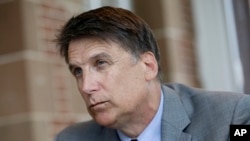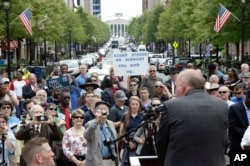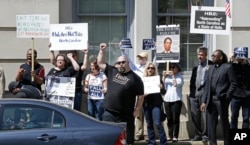North Carolina Governor Pat McCRory has responded to intense criticism over his state's so-called "bathroom bill," signing an executive order that alters key provisions in the measure but leaves in place its most controversial elements.
The executive order allows private businesses in the state to establish their own policies regarding the use of bathrooms and locker rooms by transgender people and restores some of the equal opportunity employment policies and rights to sue for discrimination.
The order signed Tuesday does not change the most controversial part of the law, which stipulates that bathrooms and locker rooms in public schools, agencies and universities must be designated for use only by people based on their biological sex at birth.
Bathroom facilities
Transgender people would only be entitled to use bathroom facilities matching their preferred gender identity if they have had their birth certificates legally changed to reflect their transition from male to female or the reverse.
McCrory signed the legislation into law last month.
The move comes as the debate in the United States over differences between religious beliefs and individual rights shows no signs of flagging.
Laws seen as undermining LGBT rights in several Southern states have sparked protests and boycott threats from businesses and entertainers, as well as counterdemonstrations by conservatives.
Hundreds of people gathered in Raleigh, North Carolina, near the governor's offices, to support the bill earlier Monday.
Signs declaring "No men in women's bathrooms," emphasize a point in the new law that has drawn wide support among state residents who hold conservative political views.
A smaller crowd of about 100 people staged a counterprotest.
Protesters
Their chants – “Bigotry is bad for busines." "They are preaching hate!" "They don’t represent our state!" – were drowned out by the larger group opposed to extending equal rights protections to people who are transgender, The Associated Press reported Monday.
Democratic presidential candidate Hillary Clinton called the law “shameful,” and a number of high-profile businesses including Apple and American Airlines are threatening to withdraw from the state.
Rock music legend Bruce Springsteen, who canceled a North Carolina concert that was planned for this past Sunday, posted a message on his website: "Some things are more important than a rock show, and this fight against prejudice and bigotry – which is happening as I write – is one of them."
Many businesses have criticized the law, but few have taken specific action to underscore their disagreement with the state over the issue.
College athletics
The National Basketball Association and the National Collegiate Athletic Association (NCAA), which had been considering moving sporting events out of the state as a protest, have since decided they will not change venues.
The North Carolina NAACP has threatened civil disobedience if the state legislature does not act to repeal the law when it comes back into session on April 25.
Mark Creech of the Christian Action League told the crowd in Raleigh this week that his organization plans to rally in support of the law when the legislature reconvenes. He denounced "a smear campaign [that] has resulted in unfounded criticism of the law.”






